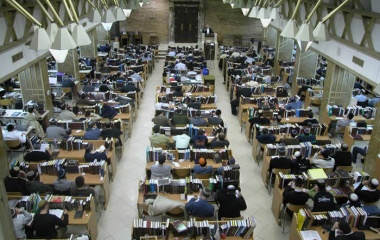
“And I have given them statutes that are not good, and laws that they do not live with" (Yechezkel 20:25). In our last post, we discussed the application of this verse to those who learn Torah without singing. While there is much to be gained in using song in study, Abaye is startled that one who does not learn via song is in fulfillment of this verse--a seemingly harsh appraisal for one who is, in actual fact, learning Torah.
He thus offers an alternate explanation: “Rather, like Rabbi Mesarsha, who said: Two Torah scholars who sit in one city and are not comfortable with each other in matters of Jewish law” (Megillah 32a). The Sages were well aware of the tendency of Torah scholars to be jealous of and often to belittle other scholars whose views they do not share. The Netziv, the great Rosh Yeshiva in Volozhin, notes that the priestly blessing, “May G-d bless you and guard you” (Bamidbar 6:24), is a prayer for the protection of Torah scholars from the jealousy of others[1]. In a more well-known piece, he explains that it was this looking down on others who may have practiced Judaism in a slightly different matter than oneself that led to the destruction of the Temple. Even if motivated for the sake of heaven, it makes little difference, as “G-d cannot tolerate righteous people like these” (Haemek Davar, Introduction to Breisheet). A united Jewish people, where differences are respected, especially amongst our religious leadership, is crucial for the well-being of the Jewish people.
“If two people sit and there is no Torah between them, it is a sitting of scoffers” (Avot 2:3). This teaching is generally understood to mean that if two people come together, they should engage in words of Torah; if not they are, consciously or not, treating Torah with little respect. However, Rav Chaim of Volozhin explains that it is not the ignoring of Torah that is the problem, it is the ignoring of people that the Mishnah is decrying. We are, he explains, talking about a situation of two people sitting who are studying Torah. However, there is no Torah between them--each one is busy studying in his own little world, oblivious to others. Each sadly believes there is no benefit in interacting with others, who may have a different approach and different insights that can be enriching but are sadly ignored. The two scholars are, in essence, scoffing at each other; and by extension at the Torah. it is the height of scoffery to imagine that one need not venture outside of their “four cubits of learning”. The Torah is so much richer, wider, and deeper than any one person.
And thus, our Gemara teaches that if two scholars are in the same city--and with modern methods of communication, we can extend this well beyond a city--and they are not “comfortable” with one another, they have failed to grasp the richness and multiplicity of Torah teachings. One must welcome and feel comfortable interacting with those on the other side of the room. To do otherwise is a fulfillment of the verse, “I have given them statutes that are not good, and laws that they do not live with". It is for this very reason that the the traditional method of Torah study is to be with a chevruta, a partner who is literally your friend.
We can now better appreciate the teaching of the Talmud immediately following. "Rav Parnach said [in the name of] Rav [who] said: 'Whomever holds a sefer Torah naked will be buried naked'”. In contrast to the Megillah, the inherent holiness of a Torah forbids one from holding its parchment with bare hands. The Gemara explains that this teaching does not literally mean we are to bury such a person naked, but rather, he will be buried naked of that mitzvah. As Tosafot (s.v. blo oto mitzva) explains, this cannot mean that if while tying the sefer Torah, one held on to it, he does not get the reward for tying the Torah, as such is obvious. Rather, it refers to a separate mitzvah one is doing “at the same time”. If one learns Torah while holding onto the parchment itself, the Torah they are learning is lacking. One cannot teach Jewish law and yet ignore it at the same time. This is a practical example of the idea expressed above, that one may not learn while ignoring others who are next to you. .
And with this, we now come to the final teaching of Masechet Megillah. “Our Rabbis taught: Moshe decreed to the Jewish people that they should enquire and seek on the matters of the day, the laws of Pesach on Pesach, the laws of Shavuot on Shavuot, and the laws of Sukkot on Sukkot”.
Yom Tov is the time when Jews from all walks of life are meant to come together. The Yamim Tovim celebrate great moments in the history of the Jewish people, all of the Jewish people. We dare not sit and not be comfortable with others--others who are different than us--as we can and must learn from everyone.
And this is what Purim, i.e., Masechet Megillah, is all about. “Go gather the entire nation” as we celebrate “joy, happiness, and a Yom Tov, and the sending of gifts one to another" (Esther 9:19). May we thus merit "statutes that are good and laws that they live with".
[1] The Netziv explains that each group of people needs protection that the blessings they have will not end up being a curse. A business person needs a blessing that his success in business will not lead to the many negatives money can bring. In light of the suicide of Robin Williams this week, many have--at least temporarily--been made aware that, all too often, the blessings of fame and success can be a huge curse.



